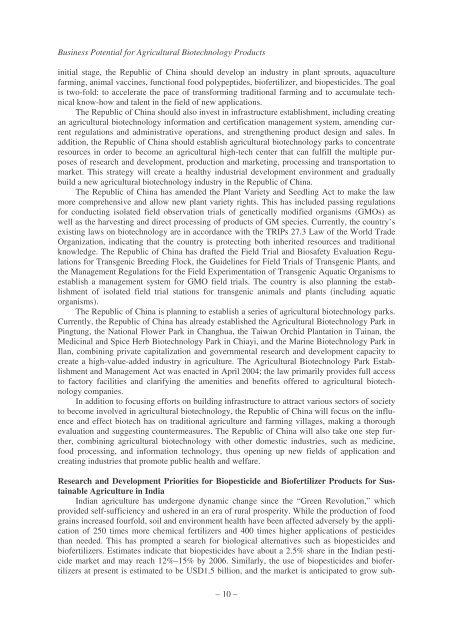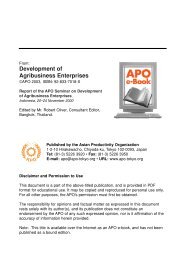Business Potential for Agricultural Biotechnology - Asian Productivity ...
Business Potential for Agricultural Biotechnology - Asian Productivity ...
Business Potential for Agricultural Biotechnology - Asian Productivity ...
You also want an ePaper? Increase the reach of your titles
YUMPU automatically turns print PDFs into web optimized ePapers that Google loves.
<strong>Business</strong> <strong>Potential</strong> <strong>for</strong> <strong>Agricultural</strong> <strong>Biotechnology</strong> Products<br />
initial stage, the Republic of China should develop an industry in plant sprouts, aquaculture<br />
farming, animal vaccines, functional food polypeptides, biofertilizer, and biopesticides. The goal<br />
is two-fold: to accelerate the pace of trans<strong>for</strong>ming traditional farming and to accumulate technical<br />
know-how and talent in the field of new applications.<br />
The Republic of China should also invest in infrastructure establishment, including creating<br />
an agricultural biotechnology in<strong>for</strong>mation and certification management system, amending current<br />
regulations and administrative operations, and strengthening product design and sales. In<br />
addition, the Republic of China should establish agricultural biotechnology parks to concentrate<br />
resources in order to become an agricultural high-tech center that can fulfill the multiple purposes<br />
of research and development, production and marketing, processing and transportation to<br />
market. This strategy will create a healthy industrial development environment and gradually<br />
build a new agricultural biotechnology industry in the Republic of China.<br />
The Republic of China has amended the Plant Variety and Seedling Act to make the law<br />
more comprehensive and allow new plant variety rights. This has included passing regulations<br />
<strong>for</strong> conducting isolated field observation trials of genetically modified organisms (GMOs) as<br />
well as the harvesting and direct processing of products of GM species. Currently, the country’s<br />
existing laws on biotechnology are in accordance with the TRIPs 27.3 Law of the World Trade<br />
Organization, indicating that the country is protecting both inherited resources and traditional<br />
knowledge. The Republic of China has drafted the Field Trial and Biosafety Evaluation Regulations<br />
<strong>for</strong> Transgenic Breeding Flock, the Guidelines <strong>for</strong> Field Trials of Transgenic Plants, and<br />
the Management Regulations <strong>for</strong> the Field Experimentation of Transgenic Aquatic Organisms to<br />
establish a management system <strong>for</strong> GMO field trials. The country is also planning the establishment<br />
of isolated field trial stations <strong>for</strong> transgenic animals and plants (including aquatic<br />
organisms).<br />
The Republic of China is planning to establish a series of agricultural biotechnology parks.<br />
Currently, the Republic of China has already established the <strong>Agricultural</strong> <strong>Biotechnology</strong> Park in<br />
Pingtung, the National Flower Park in Changhua, the Taiwan Orchid Plantation in Tainan, the<br />
Medicinal and Spice Herb <strong>Biotechnology</strong> Park in Chiayi, and the Marine <strong>Biotechnology</strong> Park in<br />
Ilan, combining private capitalization and governmental research and development capacity to<br />
create a high-value-added industry in agriculture. The <strong>Agricultural</strong> <strong>Biotechnology</strong> Park Establishment<br />
and Management Act was enacted in April 2004; the law primarily provides full access<br />
to factory facilities and clarifying the amenities and benefits offered to agricultural biotechnology<br />
companies.<br />
In addition to focusing ef<strong>for</strong>ts on building infrastructure to attract various sectors of society<br />
to become involved in agricultural biotechnology, the Republic of China will focus on the influence<br />
and effect biotech has on traditional agriculture and farming villages, making a thorough<br />
evaluation and suggesting countermeasures. The Republic of China will also take one step further,<br />
combining agricultural biotechnology with other domestic industries, such as medicine,<br />
food processing, and in<strong>for</strong>mation technology, thus opening up new fields of application and<br />
creating industries that promote public health and welfare.<br />
Research and Development Priorities <strong>for</strong> Biopesticide and Biofertilizer Products <strong>for</strong> Sustainable<br />
Agriculture in India<br />
Indian agriculture has undergone dynamic change since the “Green Revolution,” which<br />
provided self-sufficiency and ushered in an era of rural prosperity. While the production of food<br />
grains increased fourfold, soil and environment health have been affected adversely by the application<br />
of 250 times more chemical fertilizers and 400 times higher applications of pesticides<br />
than needed. This has prompted a search <strong>for</strong> biological alternatives such as biopesticides and<br />
biofertilizers. Estimates indicate that biopesticides have about a 2.5% share in the Indian pesticide<br />
market and may reach 12%–15% by 2006. Similarly, the use of biopesticides and biofertilizers<br />
at present is estimated to be USD1.5 billion, and the market is anticipated to grow sub-<br />
– 10 –
















